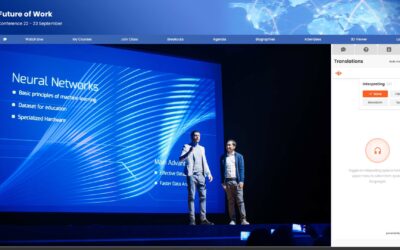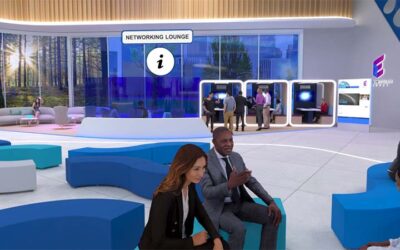Procreation are delighted to announce their new...

Understanding what the Metaverse really is
Do we really understand what the Metaverse is?
There’s been lots of discussion about the Metaverse in the last year or so, with businesses scrabbling to stake their claim in it, but it’s clear that it’s still very unclear to many what it actually is. While many technologists may have a good handle, in their own mind, as to what it’s about and the possible future applications, the rest of the world still don’t really understand what the Metaverse is, and what it really means. Many don’t know what impact it’s likely to have on our daily lives personally or professionally.
“There has been, and will continue to be “a growing focus on integrating the digital and physical worlds using the Internet.”
Frequently asked questions
There are lots of questions, and here are a few that we’ve heard more than once so you’re not alone if you’ve asked yourself any of these…
- What is the Metaverse?
- Is it owned by Meta (previously known as Facebook)? Or is it owned by someone else?
- Is it a game like Minecraft, Roblox or Fortnight?
- Will we all start walking around with VR headsets on and have chips in our arms?!
In short, there are many questions unanswered and many developments continually unfolding. However, the Metaverse is not something that’s going to happen overnight, but change is most certainly coming and it is important to recognise how it will affect our lives so we can use it to shape our future. Here’s our (hopefully simple) take on what the Metaverse is and what it is likely to mean for us as a species moving forward.
What does it all mean?
First let’s look at the wording. The word “Meta” is derived from the Greek μετά, which encompasses a wide array of meanings, such as “with”, “after”, “alongside”, “on top of”, “beyond” and “greater than” (BBC, 2021). The word “Metaverse” was first coined in 1992 by Neal Stephenson in his science fiction novel Snow Crash, where two parallel worlds – physical and virtual, exist as one.
What the Metaverse will actually be in the future hasn’t been decided yet and it will be guided by technological advancement and its subsequent adoption (or not) in the world. However, if we were to use the information available right now and the technology being used, the widely recognised definition of the Metaverse is as follows:
The Metaverse is… “A persistent (always on) simulated digital environment with a blend of augmented reality (AR), virtual reality (VR), mixed reality, Blockchain, and other technologies. These technologies are used to develop highly immersive 3D virtual world experiences for an unlimited number of users. The Metaverse enhances the internet experience by creating a virtual world in which users can, among other things, conduct business & training, learn, socialize, engage in immersive games, buy and sell virtual real estate, and enjoy immersive entertainment.”

Still lost?! It’s okay if you are!
To put it simply, the Metaverse is an aspiration. It is not a singular thing or action, company or platform, but a term that can be described as the next major wave of computing and networking.
The Metaverse is the next phase and evolution that started with Supercomputers (1960’s), to personal computing (1980’s), the internet (1990’s), smart phones and cloud computing (2007…). Next up, the Metaverse. It’s not a video game or virtual reality in its own, but it is a blend of several technologies that will enrich the internet as we know it.
What is the Metaverse?
This remains to be seen, and will develop in time, but it is likely that the Metaverse will combine immersive experiences, augmented reality and 3D experiences that are continually changing and affected by the people who use them. The Metaverse will allow humans to interact in a unified way, creating an individual sense of presence, experiencing virtual worlds simultaneously, using hardware that has yet to be invented, and on platforms that are far more sophisticated than the ones we know today.
An important part of this development is interoperability which Wikipedia defines as “the ability of computer systems or software to exchange and make use of information.”
The internet as we know it is interoperable; meaning you can take one ‘thing’ (i.e. an image) from one platform (i.e. Facebook), upload this to another platform (i.e. Instagram), turn it into a video using a video editor (i.e. iMovie) and upload it as a presentation to your website or YouTube (as an example.) The Metaverse is likely to be similar, insomuch that different technologies and platforms will be able to talk to each other, seamlessly and safely, but in a more sophisticated way than we’ve ever seen before.
We can group together technologies that we often categorize on their own such as social media, the internet, mobile and live streaming and understand that these technologies are the result of the enhanced capabilities of the internet as it’s evolved. For example, Facebook started as a platform on personal computers, and although successful, only saw hypergrowth when mobile became commonplace. We can expect a similar level of jump in the type of things we do, and how we do them, when the Metaverse matures.

How will the Metaverse change my life?
There are many elements that will affect the Metaverse’s development and movement from a ‘concept’ to reality for the everyday person. Things that we can expect to change? Here are a few thoughts to get you thinking:
- The hardware and devices we’ll use. We weren’t designed to spend our lives on a screen, and this is likely to change. Items such as high quality cameras and scanners may be incorporated into future buildings and public areas which then allows us to interact with technology differently to how we do today. Wearable technology will improve such as smart glasses from the likes of Snap and Magic Leap, plus Meta’s next Quest 3 headset is destined to raise the bar in 2023. Do you remember before smart watches were even a thing?
- Computing power. To do more, computing power needs to exceed what is currently available. The scope of this ranges from bandwidth and infrastructure to the devices we use, and beyond. This enhanced capability and will support higher quality real time rendered worlds and avatars, and faster networks and connectivity between larger numbers of people.
- Platforms. We’re all used to several platforms that we use on a daily basis, but they will evolve, there will be new ones, and they’ll work differently and better. From workplaces, training and social spaces, to entertainment virtual worlds and much more.
- Experiences. People will be brought together in real time to virtual spaces, but with a level of presence not yet possible, and the ability to make eye contact, making each Metaverse experience an authentic and engaging one.
- Payments, financial security and privacy. Payment ‘rails’ will make sure that there are robust networks for payments in this new era. Decentralized platforms like Web3, NFT’s, blockchain and crypto such as Ethereum (ETH), Solana (SOL) and Polygon (MATIC) are just some of the new technologies that are part of the development of The Metaverse.
Finally, the content that occupies the Metaverse will define how we use it, and we will define what content we need to interact successfully in the Metaverse. Technologist Matthew Ball likens the Metaverse to a Shopping Mall in this great example…
- The Metaverse – The Shopping Mall – the ecosystem
- The hardware – the escalator
- The shops – the virtual platform/s
But in order to work, the Shopping Mall (or the Metaverse) needs real people to enter it and interact and it needs the right infrastructure to operate.
When will it arrive?
Well, although much of the Metaverse we refer to here is a vision of something in the future, many technologies are already here and being used today, albeit for professional applications. Platforms such as Nvidia’s Omniverse and Epic Games’ Unreal Engine have been used to successful effect in manufacturing and city planning with the creation of ‘Digital Twins’ – a real time, virtual copy of a city, factory or piece of machinery, allowing businesses to optimize efficiency and perform sometimes dangerous training within the safety of a virtual environment. Similar game engines are being used by Johns Hopkins University to perform spinal surgery enabling surgeons to see inside a patient’s bone and perform game changing operations. Procreation’s ImmersivePro platform is being used by a number of organisations as an ‘always on’ Virtual Experience Centre to host daily huddles, regular conferences and run training programmes with an integrated LMS. While these examples are not truly connected in one virtual world, they use elements of what is imagined to be the future Metaverse. More importantly they provide real world examples of how this technology can be applied.
In conclusion
It is just the beginning for the Metaverse, and it’s unlikely that one day it just ‘switches on’, but it’s certainly a space where individuals, businesses and organizations will come together to collaborate, explore, learn and create in multiple ways.
“While we are at the early days of the Metaverse, it will advance very quickly. If companies don’t act now, they’ll find themselves operating in worlds designed by, and for, someone else.”
The technology behind the Metaverse and its subtle but colossal shift could change everything about how we interact with each other online, how we work, how we create, and how we live. There are indeed many unknowns ahead, but it’s anticipated that the Metaverse market will reach $824.53 billion by 2030 from $27.21 billion in 2020, (Verified Market Research, 2021). Now that’s not to be sniffed at. Watch this space. It’s an exciting time.
What do you think about the Metaverse? Have you started your journey yet, and if so what have you discovered so far? We’d love to hear your thoughts…
Get in touch with our team to discuss your next project, whether it’s virtual, hybrid or how we can help you get started in the Metaverse.
More insights from the Procreation blog
Procreation and Interprefy partnership
Unmissable features for Virtual Events: Network Café
Virtual Event Feature spotlight - Networking...
Gen Z in the workplace: what you need to know
Gen Z – the next generation of workers Gen Z is...



